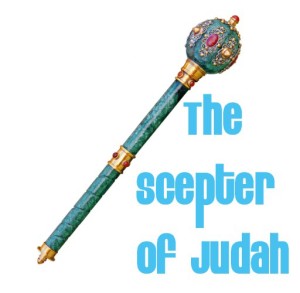 “The scepter shall not depart from Judah… until Shiloh come.” Genesis 49:8-10 This prophetic statement was included in a blessing given by Jacob, just before he died, to his third son Judah. The blessing began “Judah, thou art he whom they brothers shall praise”, and continued the bestowal of the Messianic lineage by divine selection rather than by natural birth rite. Judah had no special moral qualifications for this blessing. He had conspired with eight of his brothers to kill his half-brother, Joseph. He had illicit sexual relations with his daughter-in-law, Tamar. He was not the oldest like Reuben. He was not the favorite like Joseph. And yet the scepter, the symbol of rulership, was given to him. [Read more…] about Understanding the Messianic Prophecies, Part IV
“The scepter shall not depart from Judah… until Shiloh come.” Genesis 49:8-10 This prophetic statement was included in a blessing given by Jacob, just before he died, to his third son Judah. The blessing began “Judah, thou art he whom they brothers shall praise”, and continued the bestowal of the Messianic lineage by divine selection rather than by natural birth rite. Judah had no special moral qualifications for this blessing. He had conspired with eight of his brothers to kill his half-brother, Joseph. He had illicit sexual relations with his daughter-in-law, Tamar. He was not the oldest like Reuben. He was not the favorite like Joseph. And yet the scepter, the symbol of rulership, was given to him. [Read more…] about Understanding the Messianic Prophecies, Part IV
All Blog Posts
Understanding the Messianic Prophecies, Part III
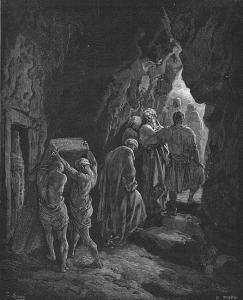 In this series we will continue to perform a temporary “about face” in our quest to discover wisdom. By reassessing the historical and literal validity of selected parts of the bible, we shall try to answer four questions. (1) Is the Messiah of the Gospels merely of allegorical importance, as one sect of the first century Gnostics proposed? (2) Does history and archeology regarding the Jewish people validate the existence of a flesh and blood Messiah? (3) Did this Messiah atone for the sins of others? (4) Do historical and allegorical messages in the bible oppose or complement each other? I shall explain later why the “about face” is necessary and only temporary. [Read more…] about Understanding the Messianic Prophecies, Part III
In this series we will continue to perform a temporary “about face” in our quest to discover wisdom. By reassessing the historical and literal validity of selected parts of the bible, we shall try to answer four questions. (1) Is the Messiah of the Gospels merely of allegorical importance, as one sect of the first century Gnostics proposed? (2) Does history and archeology regarding the Jewish people validate the existence of a flesh and blood Messiah? (3) Did this Messiah atone for the sins of others? (4) Do historical and allegorical messages in the bible oppose or complement each other? I shall explain later why the “about face” is necessary and only temporary. [Read more…] about Understanding the Messianic Prophecies, Part III
An esoteric interpretation of the crucifixion of Jesus
 At the moment we live in the period leading up to Passion Week again, and therefore I would like to give an explanation of some of the names and words that figure prominently in the Passion story, interpreted from the hidden meaning of the Hebrew translation of these words, as they already explain what this story is really about. [Read more…] about An esoteric interpretation of the crucifixion of Jesus
At the moment we live in the period leading up to Passion Week again, and therefore I would like to give an explanation of some of the names and words that figure prominently in the Passion story, interpreted from the hidden meaning of the Hebrew translation of these words, as they already explain what this story is really about. [Read more…] about An esoteric interpretation of the crucifixion of Jesus
Understanding the Messianic Prophecies, Part II
 The Jewish people have always had a longing for Messiah. In Part I of this series we learned that the Hebrew prophets spoke of two archetype Messiahs – the Suffering Servant, one who would save them from the war against human sin within, and the Triumphant King, one who would save them from the political war without. In much of Jewish literature outside the bible, including the Talmud and the Targums (sermons delivered in the common language of the people) the rabbis speculated about how these two contrasting depictions of the Messiah would manifest. [Read more…] about Understanding the Messianic Prophecies, Part II
The Jewish people have always had a longing for Messiah. In Part I of this series we learned that the Hebrew prophets spoke of two archetype Messiahs – the Suffering Servant, one who would save them from the war against human sin within, and the Triumphant King, one who would save them from the political war without. In much of Jewish literature outside the bible, including the Talmud and the Targums (sermons delivered in the common language of the people) the rabbis speculated about how these two contrasting depictions of the Messiah would manifest. [Read more…] about Understanding the Messianic Prophecies, Part II
Understanding the Messianic Prophecies, Part I
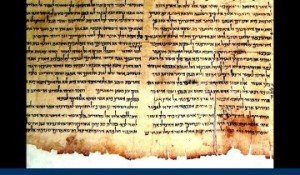 By the time Jesus is said to have appeared in Jerusalem, the rabbis knew that the scriptures described two archetypes of Messiah – a humiliated Messiah, known as the Suffering Servant, who in the tradition of the prophets would be scorned by his peers while attempting to touch men’s hearts regarding the issues of sin; and an exalted Messiah, known as the Triumphant King, who in the tradition of an idealized King David, would restore Israel to world prominence and also usher in a Golden Age where the lion would sit down with the lamb. [Read more…] about Understanding the Messianic Prophecies, Part I
By the time Jesus is said to have appeared in Jerusalem, the rabbis knew that the scriptures described two archetypes of Messiah – a humiliated Messiah, known as the Suffering Servant, who in the tradition of the prophets would be scorned by his peers while attempting to touch men’s hearts regarding the issues of sin; and an exalted Messiah, known as the Triumphant King, who in the tradition of an idealized King David, would restore Israel to world prominence and also usher in a Golden Age where the lion would sit down with the lamb. [Read more…] about Understanding the Messianic Prophecies, Part I
Are There Really Codes in the Bible?
 Joshua touches on this subject in his recent article The Bible Code Controversy. Personally I believe there are, but of course it is of the utmost importance to carefully examine whatever you find in order to preclude the possibility of errors or coincidences.
Joshua touches on this subject in his recent article The Bible Code Controversy. Personally I believe there are, but of course it is of the utmost importance to carefully examine whatever you find in order to preclude the possibility of errors or coincidences.
Why would there have to be codes in the Bible to begin with? [Read more…] about Are There Really Codes in the Bible?
Krishna’s 16,000 Wives?
 When I was younger, the average Westerner knew very little about the religions of Southeast Asia. One day, baldheaded devotees in strange clothing appeared in our airports chanting “Hare Krishna”. Then came the meditation instructors and yoga teachers. One Westerner made a fortune publishing the Kama Sutra. And in those days, Gandhi inspired us all.
When I was younger, the average Westerner knew very little about the religions of Southeast Asia. One day, baldheaded devotees in strange clothing appeared in our airports chanting “Hare Krishna”. Then came the meditation instructors and yoga teachers. One Westerner made a fortune publishing the Kama Sutra. And in those days, Gandhi inspired us all.
Our Western culture has greatly benefited from the infusion of Southeast Asian culture into our own, and yet we still do not know much about the native religion and its sacred scripture. [Read more…] about Krishna’s 16,000 Wives?
The Bible Code Controversy
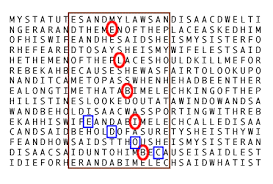 Many readers of SOS may remember a book called The Bible Code by Michael Drosnin. It was first published in 1997 and remained on the New York Times best seller list for months. I was recently sent a copy of this book by a friend, and we had a brief discussion on its relevance to Biblical interpretation. [Read more…] about The Bible Code Controversy
Many readers of SOS may remember a book called The Bible Code by Michael Drosnin. It was first published in 1997 and remained on the New York Times best seller list for months. I was recently sent a copy of this book by a friend, and we had a brief discussion on its relevance to Biblical interpretation. [Read more…] about The Bible Code Controversy
Clearing The Way to Christ-Consciousness
 “The Apostles got into the Boat and went to the other side.”
“The Apostles got into the Boat and went to the other side.”
—Matthew 14:22
Keep this scripture in mind as we weave our way through this article. We shall return to it later.
For centuries, like beavers, man has been building dams, blocking his or her divine nature. Consequently, so many people in the world today are living their soul-potential unconsciously, as conscious ignorance or inverted bliss. [Read more…] about Clearing The Way to Christ-Consciousness
On the Sacred Path with Gilgamesh and Enkidu
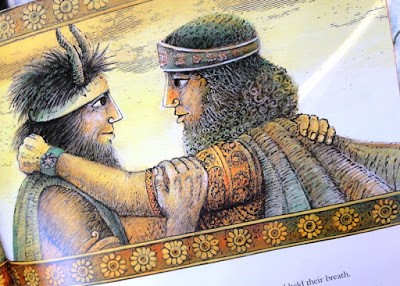 How much of the bible is derived from stories told by cultures more ancient than itself? In my previous post “The Flood: Biblical vs. Mesopotamian Narratives” we found so many similarities in detail between Noah’s Ark and the flood story in the Epic of Gilgamesh. The dimensions of the vessel, the use of birds to tell when the land became dry, the performance of sacrificial rites after landing, and so on, were all alike. The moral of the stories differ, of course. Noah and his family learn about God’s grace amidst judgment, whereas Gilgamesh learns humility in light of man’s earthly mortality. [Read more…] about On the Sacred Path with Gilgamesh and Enkidu
How much of the bible is derived from stories told by cultures more ancient than itself? In my previous post “The Flood: Biblical vs. Mesopotamian Narratives” we found so many similarities in detail between Noah’s Ark and the flood story in the Epic of Gilgamesh. The dimensions of the vessel, the use of birds to tell when the land became dry, the performance of sacrificial rites after landing, and so on, were all alike. The moral of the stories differ, of course. Noah and his family learn about God’s grace amidst judgment, whereas Gilgamesh learns humility in light of man’s earthly mortality. [Read more…] about On the Sacred Path with Gilgamesh and Enkidu
The Tree of Judgement?
 One of the themes in the Bible that has always fascinated mankind is that of the Garden of Eden and the tree of the knowledge of good and evil, with the serpent lying on one of its branches.
One of the themes in the Bible that has always fascinated mankind is that of the Garden of Eden and the tree of the knowledge of good and evil, with the serpent lying on one of its branches.
During the period of October 2013 – January 2014, I wrote a series of articles for SOS, mostly about the esoteric interpretation of Bible texts, based on Hebrew numerology. In at least five of these articles this theme of the tree of the knowledge of good and evil and the serpent was examined, each following article building on the findings of the previous ones. [Read more…] about The Tree of Judgement?
The Flood: Biblical vs. Mesopotamian Narratives
 We are all familiar with the story of The Flood in the Hebrew Bible. But this is not the first account of a catastrophic near-extinction event in recorded human history. The Mesopotamians who lived centuries before the book of Genesis was written had their very own captivating flood story similar to Genesis in many ways, but told in the style and traditions of their own rich and unique culture. [Read more…] about The Flood: Biblical vs. Mesopotamian Narratives
We are all familiar with the story of The Flood in the Hebrew Bible. But this is not the first account of a catastrophic near-extinction event in recorded human history. The Mesopotamians who lived centuries before the book of Genesis was written had their very own captivating flood story similar to Genesis in many ways, but told in the style and traditions of their own rich and unique culture. [Read more…] about The Flood: Biblical vs. Mesopotamian Narratives
Part V Section Three: The Life of Christ, Epiphany to Easter
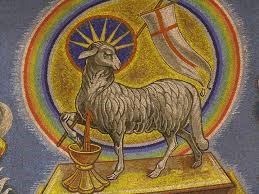 In the picture to the left, we see the Sol in Aries, Light of the World in the Lamb, the latter standing at the Heart of the Sevenfold Covenant that is “the bow in the heavens” (Post-Flood, God’s Promise to Noah). Within this covenant, Seven Shining Planets emanate from The Golgoltha, or skull, of The One Sun. The Terrestrial Grail catches the Lambs-Blood Offering of Spring atop The Tabernacle. [Read more…] about Part V Section Three: The Life of Christ, Epiphany to Easter
In the picture to the left, we see the Sol in Aries, Light of the World in the Lamb, the latter standing at the Heart of the Sevenfold Covenant that is “the bow in the heavens” (Post-Flood, God’s Promise to Noah). Within this covenant, Seven Shining Planets emanate from The Golgoltha, or skull, of The One Sun. The Terrestrial Grail catches the Lambs-Blood Offering of Spring atop The Tabernacle. [Read more…] about Part V Section Three: The Life of Christ, Epiphany to Easter
Constantine, Eusebius, and the Formulation of the New Testament Canon
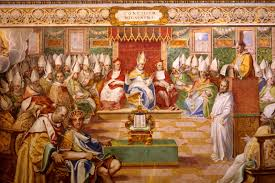 Recently I had a conversation with a friend about the history of New Testament. Everyone here on SOS knows and understands the symbolic importance of it, but there are many differences of opinion on whether it is literal history or not. It’s always been important to me to allow readers to have open discussions and even disagreements on the blog to expand our understanding. [Read more…] about Constantine, Eusebius, and the Formulation of the New Testament Canon
Recently I had a conversation with a friend about the history of New Testament. Everyone here on SOS knows and understands the symbolic importance of it, but there are many differences of opinion on whether it is literal history or not. It’s always been important to me to allow readers to have open discussions and even disagreements on the blog to expand our understanding. [Read more…] about Constantine, Eusebius, and the Formulation of the New Testament Canon
Jacob, Leah, Higher Consciousness, DMT, and the Pineal Gland
 A few years back I wrote a post about Jacob meeting God at Peniel. Jacob called the place of meeting Peniel because the Hebrew term means “face of God.” In that post we also discussed that Peniel, although a different spelling, can be associated with the pineal gland in the center of the brain. Jacob met God face to face at Peniel because the text is alluding to the mystical experience of activating the pineal gland through kundalini. The pineal gland is sensitive to this subtle yet powerful energy that science cannot yet measure. [Read more…] about Jacob, Leah, Higher Consciousness, DMT, and the Pineal Gland
A few years back I wrote a post about Jacob meeting God at Peniel. Jacob called the place of meeting Peniel because the Hebrew term means “face of God.” In that post we also discussed that Peniel, although a different spelling, can be associated with the pineal gland in the center of the brain. Jacob met God face to face at Peniel because the text is alluding to the mystical experience of activating the pineal gland through kundalini. The pineal gland is sensitive to this subtle yet powerful energy that science cannot yet measure. [Read more…] about Jacob, Leah, Higher Consciousness, DMT, and the Pineal Gland